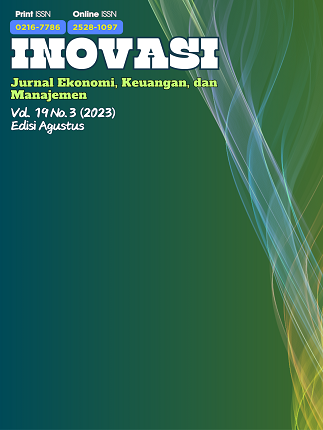Dilemma of accounting online learning system in the covid-19 pandemic in Indonesia: a complex-phenomenology approach
DOI:
https://doi.org/10.30872/jinv.v19i3.2970Keywords:
Covid19, crisis, online accounting learning, student, lecturersAbstract
We are working on a research design that explores the experiences of Accounting Lecturers throughout Indonesia, how they experience learning online in the field of Accounting. Accounting has its characteristics in the learning process. Accounting is a combination of deepening thinking intelligence, use of mathematical logic, and expertise in preparing financial reports. We use a Qualitative paradigm with a Complex Phenomenology approach, combining in-depth interviews to gather information on several informants while distributing survey questionnaires. The results show various problems that arise in online learning. We have examined high-stress levels separately what triggers stress and what are the factors that can relieve stress. The contribution of this work is certainly useful for universities to design accounting learning systems to reduce various weaknesses and problems that arise
References
Aghabalaei Bakhtiar, H., Sarraf, F., & Farajzadeh Dehkordi, H. (2018). The Relationship between Companies’ Investment Opportunity and Audit Report Lag. Journal of Iranian Accounting Review, 5(19), 1–20.
Bahn, K., Cohen, J., & van der Meulen Rodgers, Y. (2020). A feminist perspective on COVID‐19 and the value of care work globally. Gender, Work & Organization, 27(5), 695–699.
Bao, W. (2020). COVID‐19 and online teaching in higher education: A case study of Peking University. Human Behavior and Emerging Technologies, 2(2), 113–115.
Barnes, S. J. (2020). Information management research and practice in the post-COVID-19 world. International Journal of Information Management, 55, 102175.
Burgner, A., Ikizler, T. A., & Dwyer, J. P. (2020). COVID-19 and the inpatient dialysis unit: managing resources during contingency planning pre-crisis. Clinical Journal of the American Society of Nephrology: CJASN, 15(5), 720.
Chaplin, S. (2017). Accounting education and the prerequisite skills of accounting graduates: are accounting firms’ moving the boundaries? Australian Accounting Review, 27(1), 61–70.
Dixon, R. M. W., & Dixon, R. M. W. (2011). The languages of Australia. Cambridge University Press.
Fadilah, R., Parinduri, S. A., Syaimi, K. U., & Suharyanto, A. (2020). Islamic Guidance and Counseling to Overcome The Study Difficulty of Junior High School Students in SMP IT Nurul Azizi Medan (Case Study of Students Experiencing Anxiety). International Journal of Psychosocial Rehabilitation, 24, 1154–1160.
Goh, E., & Scerri, M. (2016). “I study accounting because I have to”: An exploratory study of hospitality students’ attitudes toward accounting education. Journal of Hospitality & Tourism Education, 28(2), 85–94.
Guzik, T. J., Mohiddin, S. A., Dimarco, A., Patel, V., Savvatis, K., Marelli-Berg, F. M., Madhur, M. S., Tomaszewski, M., Maffia, P., & D’acquisto, F. (2020). COVID-19 and the cardiovascular system: implications for risk assessment, diagnosis, and treatment options. Cardiovascular Research, 116(10), 1666–1687.
Liff, A. P., & Erickson, A. S. (2017). From management crisis to crisis management? Japan’s post-2012 institutional reforms and Sino-Japanese crisis (In) stability. Journal of Strategic Studies, 40(5), 604–638.
Lourenco, S. F., & Tasimi, A. (2020). No participant left behind: conducting science during COVID-19. Trends in Cognitive Sciences, 24(8), 583–584.
Pan, Y., Zhang, D., Yang, P., Poon, L. L. M., & Wang, Q. (2020). Viral load of SARS-CoV-2 in clinical samples. The Lancet Infectious Diseases, 20(4), 411–412.
Paramita, R. S., Isbanah, Y., Kusumaningrum, T. M., Musdholifah, M., & Hartono, U. (2018). Young investor behavior: implementation theory of planned behavior. International Journal of Civil Engineering and Technology, 9(7), 733–746.
Rahmawati, F., Susilowati, K. D. S., & Eltivia, N. (2022). DESIGNING DESKTOP-BASED LEARNING MEDIA USING EDUCATIONAL GAME APPLICATIONS IN INTRODUCTORY ACCOUNTING COURSES. International Journal of Multidisciplinary Research and Literature, 1(5), 549–554.
Vardarlıer, P. (2016). Strategic approach to human resources management during crisis. Procedia-Social and Behavioral Sciences, 235, 463–472.
Vosslamber, S., Van Der Voort, L. F., Van Den Elskamp, I. J., Heijmans, R., Aubin, C., Uitdehaag, B. M. J., Crusius, J. B. A., Van Der Pouwkraan, T., Comabella, M., & Montalban, X. (2011). Interferon regulatory factor 5 gene variants and pharmacological and clinical outcome of Interferonβ therapy in multiple sclerosis. Genes & Immunity, 12(6), 466–472.
Yanow, S. K., & Good, M. F. (2020). Nonessential research in the new normal: the impact of COVID-19. The American Journal of Tropical Medicine and Hygiene, 102(6), 1164.
Zeegen, E. N., Yates, A. J., & Jevsevar, D. S. (2020). After the COVID-19 pandemic: returning to normalcy or returning to a new normal? The Journal of Arthroplasty, 35(7), S37–S41.
Downloads
Published
Issue
Section
License
Copyright (c) 2025 Muhammad Ikbal, Yana Ulfah, Irwansyah, Karmila Aulia Sahaja, Alsyadilla Anggita

This work is licensed under a Creative Commons Attribution-ShareAlike 4.0 International License.






